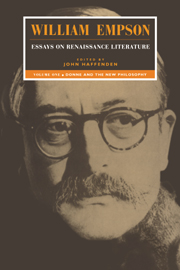Book contents
- Frontmatter
- Contents
- Preface
- Sources and acknowledgements
- Introduction by John Haffenden
- 1 Donne and the rhetorical tradition
- 2 Donne the space man
- 3 Donne in the new edition
- 4 Rescuing Donne
- 5 Donne's foresight
- 6 Copernicanism and the censor
- 7 Thomas Digges his infinite universe
- 8 Godwin's voyage to the moon
- Appendix on Galileo
- Notes
- Index
4 - Rescuing Donne
Published online by Cambridge University Press: 01 February 2010
- Frontmatter
- Contents
- Preface
- Sources and acknowledgements
- Introduction by John Haffenden
- 1 Donne and the rhetorical tradition
- 2 Donne the space man
- 3 Donne in the new edition
- 4 Rescuing Donne
- 5 Donne's foresight
- 6 Copernicanism and the censor
- 7 Thomas Digges his infinite universe
- 8 Godwin's voyage to the moon
- Appendix on Galileo
- Notes
- Index
Summary
In the twenties, when my eyes were opening, it was usual for critics to consider that Donne in his earlier poetry held broad and enlightened views on church and state, that he was influenced by the recent great scientific discoveries, and that he used the theme of freedom in love partly as a vehicle for these ideas to show what the ideological and sociological effects of Paracelsus and Copernicus would turn out to be. A critic of the time wrote: ‘His correct interpretation of the effects of the dark beginnings of our modern science places him on a level with Mr H. G. Wells for piercing insight.’ I was imitating this Donne, the poet as so conceived, in my own verse at the time with love and wonder, and I have never in later years come across any good reason for the universal change of opinion about him at the start of the thirties. I am anxious not to give too feeble an impression of the loathing with which I regard the present image of him. The habitual mean-mindedness of modern academic criticism, its moral emptiness combined with incessant moral nagging, its scrubbed prison-like isolation, are particularly misleading in the case of Donne; in fact, we are the ones who need rescuing, not the poet. But the text of the love poems does literally need rescuing, at a small number of crucial points, from the recent edition edited by Professor Helen Gardner (The Elegies and the Songs and Sonnets, Oxford, 1965).
- Type
- Chapter
- Information
- William Empson: Essays on Renaissance Literature , pp. 159 - 199Publisher: Cambridge University PressPrint publication year: 1993
- 1
- Cited by

